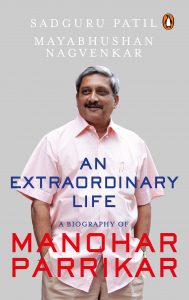‘He was gritty, complex, layered and full of colour, with never a dull moment. And in India’s smallest state, there was no other subject for a really interesting biography,’ say Sadguru Patil and Mayabhushan Nagvenkar, the authors of An Extraordinary Life: A Biography of Manohar Parrikar (Penguin India) to be released on June 22 on the four-time chief minister of Goa who they go on to add was ‘crafty, headstrong and brutal’.

In an e-mail interaction with Saurabh Tankha, the two seasoned journalists share why Parrikar fell in the league of extraordinary gentlemen. Excerpts:
What makes you say that Parrikar led an “extraordinary life”?
Politically speaking, Manohar Parrikar, despite his obvious RSS credentials, single-handedly powered the BJP to victory in a state, where the significant minority vote has historically dictated which way the balance of power ought to swing. He rose above his modest, small town upbringing and the severe political handicap of hailing from a small, politically insignificant state (in the vast national political canvas of large and populous states) to emerge as the country’s Defence Minister. In fact, no politician from Goa has ever served as a full-fledged Union cabinet minister, before Parrikar. He was also India’s first IIT alumnus to be appointed as a chief minister.
When did you decide on penning this book on the four-time chief minister of Goa and how much time did it take to finish it, cover to cover?
He was sworn-in as CM of Goa on four occasions, but incidentally never did complete a full five-year term. We resolved to write the biography soon after his death. It took us around six months to research and write the manuscript. But it was virtually an 18-hour work day for most of those six months.
How did you two go about deciding on the content, given that both of you work professionally for different organisations?
Yeah, both of us have our respective day jobs. We split up chores. Sadguru would go about sourcing information based on detailed questionnaires, which we would put together for resource persons we had shortlisted. We would meet at the end of the day to assess the information and craft more questionnaires based on the information Sadguru had gathered. At the end of each day, we would decide on the flow of the manuscript and I would prepare a draft. We would then vet the draft over the phone or in person. The next day, we would repeat the cycle.
Were there any differences during the writing stages of the book between the two of you?
Luckily, we were old enough to talk our way out of such quagmires. Our training as journalists helped to a large extent, because there was a deadline looming and it had to be met. Somewhere along the way, we worked a healthy working relationship based on a mutual trust and belief that we had to write a book which would be balanced, thorough on fact and make for a damn good read.
There are a number of anecdotes about Parrikar in the book. How difficult were accessing and collecting such personal information?
Such was Parrikar’s life that we were spoilt for choice as far as anecdotes were concerned. We have both covered him extensively as journalists for years. We were either witness to or had come across several anecdotes in that period. It was a rich spread. All we had to do, was pick up the best bits.
How was Manohar Parrikar as a politician?
Crafty, headstrong, brutal when he wanted and yet, his ace-in-the-hole was his ability to convey a personal sense of vulnerability, which made his appeal irresistible to his fans as well as fence-sitters. That connect was almost hypnotic.
How was Manohar Parrikar as a person?
In the book, we have described his antics as a child, as being very Tom Sawyerish in nature. If you cast his political aspect aside, he was a fun guy to ‘hang-out’ with, reeling out an anecdote every few minutes. He wore his flaws on his sleeves early on. For example, he made no effort to mask his weakness for beer and cigarettes. Perhaps the fear of poor perception later in his career, when the political stakes grew bigger, made him shun these two obsessions in public. As a widower, he raised two sons, both of whom he was emotionally attached to. His siblings lovingly crib about his brusqueness with a sense of nostalgia now. That’s just how he was.
How did Goa change during the periods he was the CM?
The popular signature of Parrikar’s various regimes were big ticket infrastructure projects. He loved creating spectacles. Goa also saw novel mass outreach financial schemes like distribution of computers to school students, pension for the elderly, inflation allowance for housewives, universal health schemes, waiving of VAT on petrol, etc. While their eventual delivery and the manner of execution was sketchy and the processes questionable, but he did bring a lateral elements to his style of governance.
Would Goa be different than what it is today if Parrikar was around?
Not really. She would have just been packaged better.